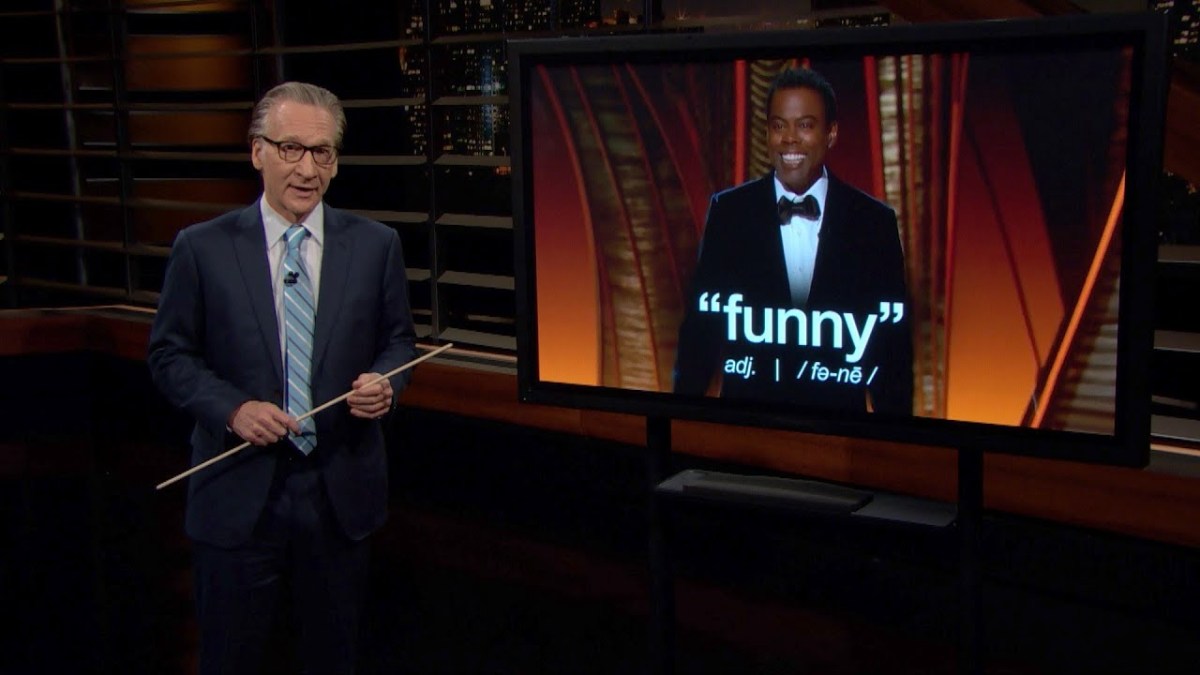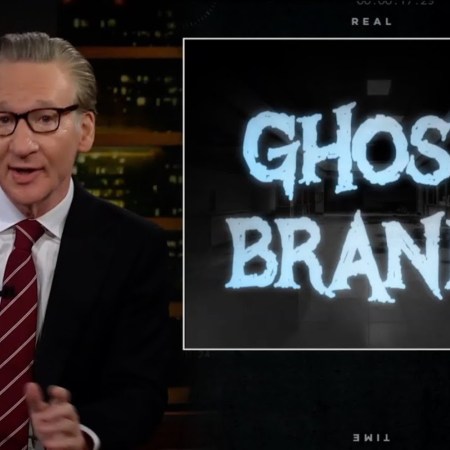The latest episode of Real Time With Bill Maher found Maher zeroing in on some local news — namely, the return of baseball to Los Angeles and Will Smith’s suspension from the Academy. From there, he pulled back to take a more national view, comparing Republicans leaving the Senate floor after Ketanji Brown Jackson was confirmed to concert audiences when the band says, “We’re going to play some songs from our new album.”
The episode’s opening monologue illustrated an issue facing Maher and — more broadly — plenty of other comedians reckoning with politics. Specifically, how does one satirize a political party that’s increasingly embraced extremist language? Maher cited the mainstreaming of QAnon rhetoric within the Republican Party as something that unnerves him; he’s far from alone in that.
Maher’s first guest was David Mamet, there to discuss his new book Recessional: The Death of Free Speech and the Cost of a Free Lunch. Mamet opened the segment by handing Maher a group of cartoons. Maher spoke about his admiration for Mamet’s writing, and asked him about his work ethic — does he still feel inspired to write at the age of 74? Mamet said he did, and from there, the two veered into a deeper look at Mamet’s working process.
From there, the two men discussed Mamet’s 2008 play November, and the story behind his Village Voice essay from the same year about breaking with liberalism. Maher spoke of the areas in which he and Mamet largely see eye to eye — including frustrations with aspects of the American left. But then things took a turn, when Maher pointed out that Mamet’s latest book included an early reference to Mamet’s apparent belief that Joe Biden’s election was not legitimate.
How, Maher asked, had Mamet gotten to that point? Mamet effectively walked back the statement made on the second page of his book, arguing that he hadn’t phrased things well there. (Though he did get a barb in on news reports surrounding Hunter Biden’s laptop in the run-up to the election.) By the end of the interview, Maher and Mamet were discussing Maher’s recurring theme of political reconciliation — though their conversation ended up being sidetracked into a debate about the difference between atheism and deism.
The evening’s panel consisted of Democracy in Chains: The Deep History of the Radical Right’s Stealth Plan for America author Nancy MacLean and David Leonhardt of The New York Times. Here, Maher returned to the theme of the Republican Party turning increasingly extremist. MacLean discussed the mainstreaming of QAnon, which led to the panel noting that that the Ivy League-educated Senators Ted Cruz and Josh Hawley were both “playing to the QAnon base for voters.”
Conversation turned to the “Don’t Say Gay” bill in Florida. Leonhardt distinguished the “serious policy issues” at stake where there was a legitimate disagreement from the “damaging and gross” conspiracy theories at work in many conservarive defenses of this legislation. MacLean spoke about the larger political trends at work — of, for instance, school boards as ways for Republican groups to increase voter turnout.
In the episode’s Overtime segment, Leonhardt discussed the economic underpinnings of some of the nation’s political issues, with MacLean expounding on some of those subjects.
The panel then moved from national to international politics. The debated the role of the United Nations with respect to Russia’s invasion of Ukraine. And more broadly, Maher raised the existential question of what it was good for, period. Leonhardt argued that the U.N. could do good work in some areas — climate change, specifically — but wasn’t at its most useful in a situation like this.
In the second half of the segment, Maher brought up Leonhardt’s COVID coverage and the new variant. Leonhardt spoke of “finding balance” and avoiding nihilism when it comes to pandemic matters. Maher and both panelists all agreed on the broad strokes and the importance of varying approaches regarding specific situations, but they also differed on a few matters; it was a very familiar debate.
For the New Rules segment, Maher quipped about the idea that the g-spot is a zone — “That’s not sex — that’s geography” — and pondered the awkwardness of being a classmate of Lenny Kravitz’s at his high school reunion. The bulk of the segment found Maher returning to an old bit: “Explaining Jokes to Idiots.” Was it a riff on Will Smith slapping Chris Rock? Yes.
“One more thing needs to be said,” Maher said. “Comedians have been under attack for some time, and I need to speak up for my tribe.” He broke down Rock’s joke, JFK style. But he also argued that Will Smith’s reaction — initially chuckling, then quickly moving to offense — reflects “how cancel culture works.”
Maher again argued for the threat of cancel culture, though he also made a relatively nonpartisan version of it — including citation of both Dave Chappelle and Kathy Griffin. The segment ended with Maher returning to his frustrations with colleges trying to restrict what comedians can discuss when they perform on campus — and plugging his own forthcoming special in the process.
Thanks for reading InsideHook. Sign up for our daily newsletter and be in the know.


















